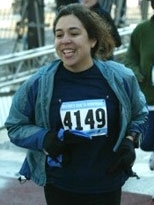If you're planning to attend the Boston Marathon on Monday, be sure to give a shout out to the many members of the MIT community participating in the race.
Thanks to "Smoot Smart," MIT's web site for members of the Institute community involved in the Marathon, you'll know whose names to yell.
"Smoot Smart" went live on March 30 and within days, MIT runners, fans and family members had shared their enthusiasm for the 26.2-mile (or 24,795-Smoot) race from Hopkinton to Boston in which 20,000 people will compete.
"Smoot Smart," named after the MIT measurement derived from an old fraternity prank, now contains dozens of stories from MIT marathoners, from first-timers to veterans, from students to alumni.
Some first-timers, like Michelle Tiu, a senior in management, were surprised to be running at all. Tiu's original intent was to support her friends. She would run alongside them for five miles, no more.
But, true to the MIT spirit, she got caught up in the Marathon challenge. "Soon the five miles became eight, which quickly turned into 13. Eventually, since I was training so much anyways, I got talked into running the WHOLE thing," Tiu said.
For Marathon veterans like Steve Bratt, chief operating officer for the World Wide Web Consortium, and Ed Steinfeld, associate professor of political science, running has become a way of life.
"My main inspiration is that I really enjoy running," said Bratt, who has been running for 33 years. "I enjoy being outdoors (yes, even in the winter), fresh air, time for reflection, seeing out-of-the-way parts of places to which I travel."
Steinfeld's daily run is both a "habit and a period of meditation--it's usually the most peaceful and focused period of my day, and a time just to detach for a while," he said.
Many MIT runners took up a double challenge, completing the grueling race itself and raising funds for charitable causes such as cancer research. For these marathoners, helping others has been the fuel that keeps them running.
Anita Villanueva, a doctoral student in electrical engineering and computer science, is a first-time marathoner who "could barely run a half-mile" in her undergraduate years. She is running with Team in Training; she has committed to raising $2,500 for the Leukemia and Lymphoma Society in memory of a family friend, age 12, who died of leukemia.
That death "made me realize that this sort of disease could strike anyone. The fact that I'm running to honor and remember those people who have suffered from leukemia and to bring hope to people that are currently battling this disease is what really has gotten me through all this training, and I know that's what'll get me to the finish line in Copley Square," Villanueva said.
Villanueva also raises funds for charity by making and selling soaps and candies.
Heath Holtz, a graduate student in management, is running the marathon for the Col. Daniel Marr Boys & Girls Club of Dorchester, Mass. His main motivation has been "the organization, kids and just finishing the marathon," he said.
Gaylee Saliba, in electrical engineering and computer science, shares that mix of generosity and excitement. Saliba is running the Marathon with her mother to raise money for CASA, a resource for abused and neglected children.
"I'm really looking forward to the race! The crowd, the start line, the finish line, the midpoint! I look forward to running Heartbreak Hill again. I'm going to miss the Marathon Day when it's over." said Saliba.
To read more stories of MIT's marathoners or to add your own, go to the "Smoot Smart" web site at web.mit.edu/marathon/.
A version of this article appeared in MIT Tech Talk on April 13, 2005 (download PDF).






